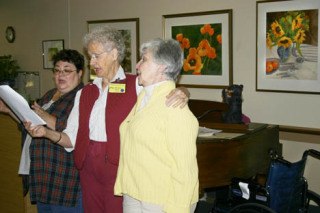Having a family member in a long-term care facility or facing the need to move a loved into a nursing home can be filled with questions and heartache, but there is a program intended to ease the process for all involved: the King County Long-Term Care Ombudsman Program.
The program, a free service, trains volunteers to visit nursing homes, assisted living facilities and adult family homes and work to improve the quality of life there by talking with the residents, determining if
there are complaints or concerns any resident might have and advocating for the resolution of those issues, be they large or small.
Currently, there are no volunteers on Vashon, and the program, which is part of Solid Ground in Seattle, is hoping that two or three people will step forward, attend a five-day training and serve as volunteers in each of the four long-term care facilities on the Island.
“They are the eyes and ears in the facility that otherwise we would not be able to have there,” said Mary Fogh, the volunteer coordinator for the ombudsman program. “That is the real kernel of why we need volunteers.”
Issues residents may want help with do not have to be large, Fogh stressed, but even simple quality of life issues sometimes need addressing — if the coffee is too hot or too cold, if the food is not palatable, if there are issues with a roommate.
“The fact they can have the kind of toast they want is important because they have few choices left,” Fogh said. “It’s the quality of life and quality of care we’re concerned with.”
When no volunteers are assigned to an area, the program’s staff ombudsman is assigned to the facilities, which is a “massive undertaking,” according to Fogh, who added that staff have time to visit facilities only when complaints are filed.
The Vashon Community Care Center (VCCC), with its skilled nursing and assisted living quarters, is the largest long-term care facility on the Island, but there are four other facilities as well that, combined, are home to 25 residents. They are Island Elder Care (with two homes), Beneficial Adult Family Home Care and Knipp Hopper Homes. Ombudsmen would serve those sites as well.
“We want someone everywhere,” Fogh said. “Our goal is that no vulnerable adult goes without assistance.”
The intent of the program is not to indict the long-term care system, Fogh stressed, but to promote dignity and quality of life.
In addition to its advocacy work, the ombudsman program provides education to families or individuals looking to find a long-term care facility so they can make informed decisions and find a place that best suits their needs.
The agency’s Web site includes guidance on selecting a nursing home, adult family home or boarding home (often called an assisted living facility). It offers links to help investigate a facility’s track record, provides questions to ask and guidance as to what to look for in a facility as well as information on residents’ rights.
At VCCC, Administrator Susan Tuller said staff would welcome an ombudsman, noting that it is the norm in the state to have them.
“We like them because their whole purpose is to be an advocate for the elderly,” she said.
They do not have regulatory authority, Tuller said, but they tend to be partners in problem solving.
When the nursing home staff perceive a resident needs an advocate, staff will call the office directly and request assistance themselves, Tuller noted.
“Sometimes it takes someone who has volunteered to really commit to solving a problem,” she added.



